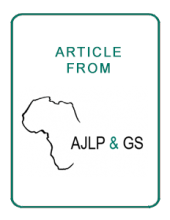/ library resources
Showing items 10 through 18 of 18.This study provides an understanding on whether land reform policies pursued by the government of Zimbabwe post-independence (1980) have an effect on the corruption in the land sector.
Various methodologies are being put in place in participatory mapping programs by actors with the aim of improving the system of land governance.
Community land and natural resources lie at the heart of social, political and economic life in much of rural Africa.
The purpose of this study is to explore the challenges of women on land rights, in Tanzania customary practices often required woman to access land through their fathers, brothers, husbands or other men who control the land, so this makes women vulnerable and decreases agricultural productiv
The Continental Land Policy Initiative, now the African Land Policy Centre, has made tremendous progress in generating knowledge on land governance since inception in 2006.
In Zambia, security of tenure for communities residing under customary land tenure settings has in recent years increasingly come under threat owing to the pressures of high rate of urbanization, speculation, subdivision and conversion to state land, which effectively excludes marginal population
Existing land governance system in Zimbabwe subjects vulnerable groups such as women to ‘land corruption’, which entrenches the already existing gendered land inequalities.
Today, the demographic and economic dynamics stimulate an increasing competition for the access to the urban land.
The study reviews the land policy in Zimbabwe and investigates the extent to which the policy provides incentives for investment and technology adoption to increase labour productivity in the agricultural sector.
Paginação
Land Library Search
Through our robust search engine, you can search for any item of the over 73,000 highly curated resources in the Land Library.
If you would like to find an overview of what is possible, feel free to peruse the Search Guide.

